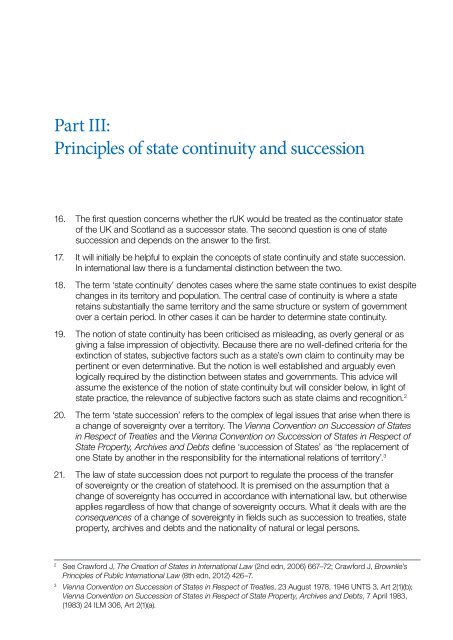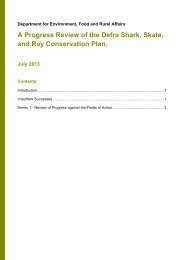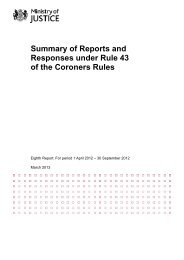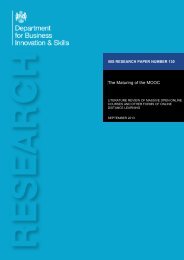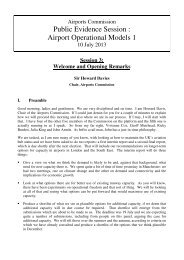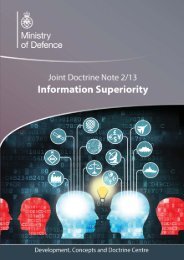Referendum on the Independence of Scotland ... - Gov.uk
Referendum on the Independence of Scotland ... - Gov.uk
Referendum on the Independence of Scotland ... - Gov.uk
Create successful ePaper yourself
Turn your PDF publications into a flip-book with our unique Google optimized e-Paper software.
Part III:<br />
Principles <strong>of</strong> state c<strong>on</strong>tinuity and successi<strong>on</strong><br />
16. The frst questi<strong>on</strong> c<strong>on</strong>cerns whe<strong>the</strong>r <strong>the</strong> rUK would be treated as <strong>the</strong> c<strong>on</strong>tinuator state<br />
<strong>of</strong> <strong>the</strong> UK and <strong>Scotland</strong> as a successor state. The sec<strong>on</strong>d questi<strong>on</strong> is <strong>on</strong>e <strong>of</strong> state<br />
successi<strong>on</strong> and depends <strong>on</strong> <strong>the</strong> answer to <strong>the</strong> frst.<br />
17. It will initially be helpful to explain <strong>the</strong> c<strong>on</strong>cepts <strong>of</strong> state c<strong>on</strong>tinuity and state successi<strong>on</strong>.<br />
In internati<strong>on</strong>al law <strong>the</strong>re is a fundamental distincti<strong>on</strong> between <strong>the</strong> two.<br />
18. The term ‘state c<strong>on</strong>tinuity’ denotes cases where <strong>the</strong> same state c<strong>on</strong>tinues to exist despite<br />
changes in its territory and populati<strong>on</strong>. The central case <strong>of</strong> c<strong>on</strong>tinuity is where a state<br />
retains substantially <strong>the</strong> same territory and <strong>the</strong> same structure or system <strong>of</strong> government<br />
over a certain period. In o<strong>the</strong>r cases it can be harder to determine state c<strong>on</strong>tinuity.<br />
19. The noti<strong>on</strong> <strong>of</strong> state c<strong>on</strong>tinuity has been criticised as misleading, as overly general or as<br />
giving a false impressi<strong>on</strong> <strong>of</strong> objectivity. Because <strong>the</strong>re are no well-defned criteria for <strong>the</strong><br />
extincti<strong>on</strong> <strong>of</strong> states, subjective factors such as a state’s own claim to c<strong>on</strong>tinuity may be<br />
pertinent or even determinative. But <strong>the</strong> noti<strong>on</strong> is well established and arguably even<br />
logically required by <strong>the</strong> distincti<strong>on</strong> between states and governments. This advice will<br />
assume <strong>the</strong> existence <strong>of</strong> <strong>the</strong> noti<strong>on</strong> <strong>of</strong> state c<strong>on</strong>tinuity but will c<strong>on</strong>sider below, in light <strong>of</strong><br />
state practice, <strong>the</strong> relevance <strong>of</strong> subjective factors such as state claims and recogniti<strong>on</strong>. 2<br />
20. The term ‘state successi<strong>on</strong>’ refers to <strong>the</strong> complex <strong>of</strong> legal issues that arise when <strong>the</strong>re is<br />
a change <strong>of</strong> sovereignty over a territory. The Vienna C<strong>on</strong>venti<strong>on</strong> <strong>on</strong> Successi<strong>on</strong> <strong>of</strong> States<br />
in Respect <strong>of</strong> Treaties and <strong>the</strong> Vienna C<strong>on</strong>venti<strong>on</strong> <strong>on</strong> Successi<strong>on</strong> <strong>of</strong> States in Respect <strong>of</strong><br />
State Property, Archives and Debts defne ‘successi<strong>on</strong> <strong>of</strong> States’ as ‘<strong>the</strong> replacement <strong>of</strong><br />
<strong>on</strong>e State by ano<strong>the</strong>r in <strong>the</strong> resp<strong>on</strong>sibility for <strong>the</strong> internati<strong>on</strong>al relati<strong>on</strong>s <strong>of</strong> territory’. 3<br />
21. The law <strong>of</strong> state successi<strong>on</strong> does not purport to regulate <strong>the</strong> process <strong>of</strong> <strong>the</strong> transfer<br />
<strong>of</strong> sovereignty or <strong>the</strong> creati<strong>on</strong> <strong>of</strong> statehood. It is premised <strong>on</strong> <strong>the</strong> assumpti<strong>on</strong> that a<br />
change <strong>of</strong> sovereignty has occurred in accordance with internati<strong>on</strong>al law, but o<strong>the</strong>rwise<br />
applies regardless <strong>of</strong> how that change <strong>of</strong> sovereignty occurs. What it deals with are <strong>the</strong><br />
c<strong>on</strong>sequences <strong>of</strong> a change <strong>of</strong> sovereignty in felds such as successi<strong>on</strong> to treaties, state<br />
property, archives and debts and <strong>the</strong> nati<strong>on</strong>ality <strong>of</strong> natural or legal pers<strong>on</strong>s.<br />
2 See Crawford J, The Creati<strong>on</strong> <strong>of</strong> States in Internati<strong>on</strong>al Law (2nd edn, 2006) 667–72; Crawford J, Brownlie’s<br />
Principles <strong>of</strong> Public Internati<strong>on</strong>al Law (8th edn, 2012) 426–7.<br />
3 Vienna C<strong>on</strong>venti<strong>on</strong> <strong>on</strong> Successi<strong>on</strong> <strong>of</strong> States in Respect <strong>of</strong> Treaties, 23 August 1978, 1946 UNTS 3, Art 2(1)(b);<br />
Vienna C<strong>on</strong>venti<strong>on</strong> <strong>on</strong> Successi<strong>on</strong> <strong>of</strong> States in Respect <strong>of</strong> State Property, Archives and Debts, 7 April 1983,<br />
(1983) 24 ILM 306, Art 2(1)(a).


